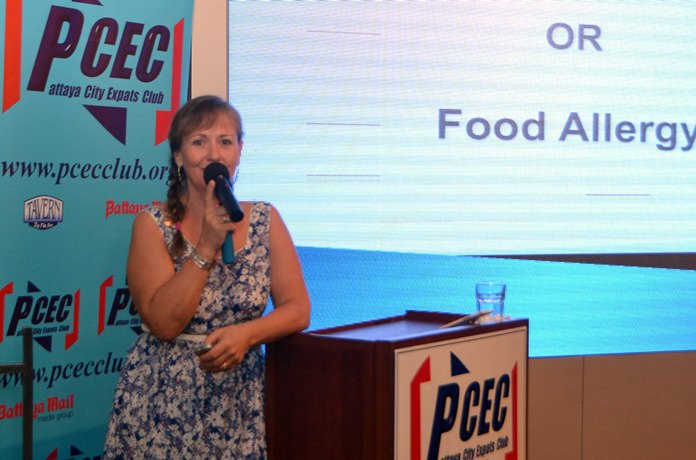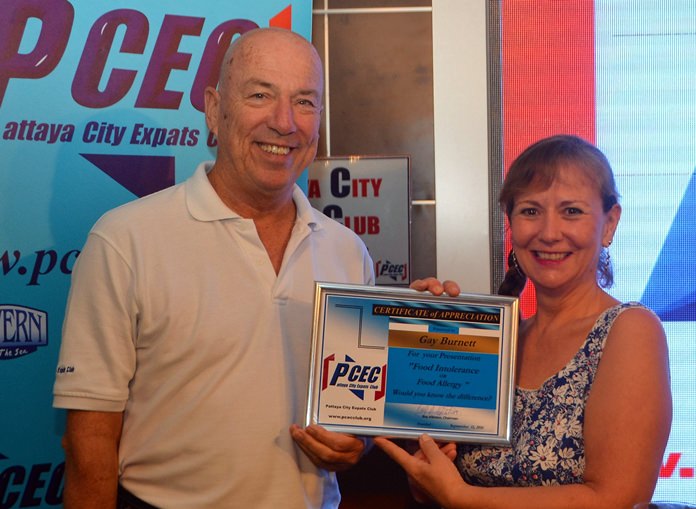Food Allergy or Intolerance – What is the difference and how do they impact on people? This was the topic of discussion at the September 11 meeting of the Pattaya City Expats Club, with guest speaker Gay Burnett, a Physiatrist working in the Pratamnak Medical Center.

Gay said that an allergy is an overreaction to a protein causing the immune system to produce antibodies. For example, Celiac Disease is a “gluten” reaction to wheat, rye, barley & oats. Allergy symptoms can include histamine release, sudden swelling, rash or hives, shortness of breath, vomiting, even collapse, which could lead to an emergency. An intolerance, on the other hand, is a chemical reaction causing a variety of symptoms within a period of hours, days even months. It can be difficult to identify the trigger(s) especially with foods, drinks and skin care products. Intolerance symptoms can be sporadic and can include bloating, weight gain, irritable bowel syndrome (20 percent of people), sinus pain or headache, rash / dermatitis, itchy eyes & ears, wheezing and chronic fatigue. An intolerance is annoying, but unlikely to lead to an emergency.

Further, your immune system is challenged every day by food, drinks, viruses, bacteria, fungi, parasites, and other elements in the environment such as dust, chemicals, pollen, aromas and dirt. Your immune system may also have genetic influences, such as asthma and hay fever. She said children have increased susceptibility with underdeveloped immunity. Therefore, it is important to teach children to breathe through the nose rather than the mouth, because the nose filters out many of the irritants. Putting Vaseline on your nose can also help because pollutants will stick to the Vaseline; Vaseline is better than oils because oils get absorbed into the skin, so pollutants won’t stick to them.

Gay said that 65 – 70 percent of the immune system is in your digestive tract. Thus identifying trigger foods is a productive way to manage your general health and wellbeing. It’s also very beneficial for pregnant women to identify trigger foods for the baby’s wellbeing. Additionally, some food and drink additives can trigger reactions; for example, nitrates in wine can cause skin rashes; MSG, very popular with Thai cooks, can cause headaches; sulphates can cause skin flushing, tingling of the lips, and swelling of the throat; and colorings, especially Carmine (the red coloring found in Coca Cola) may trigger rashes and headaches.

Some trigger foods for allergies can cause anaphylactic shock, which can be a life-threatening situation. Symptoms include acute swelling of the throat, tongue and nasal passages. The person finds it hard to breathe, and panic attacks are common. She said a simple first aid solution is to put a straw in the person’s mouth. Call for help, and stay there! Gay said another serious situation is toxic overload, where the person has become intolerant to almost all foods. It is caused by extreme gut or liver inflammation allowing rogue particles such as alcohol, sugar or drugs to enter the blood stream.

So, how can you manage food intolerances and allergies? Gay said identification of the trigger is essential. For example, in children with ADHD, removal of chemicals, artificial sweeteners, MSG, and food colorings often has immediate positive effects!
Gay mentioned several ways to test for food intolerances and allergies. Blood tests can measure for allergies, but not intolerance. A scratch test, where several potential allergens are placed on your back and then scratched into the skin’s surface; whatever you are allergic to will cause hives on your skin. You can keep a food diary, giving up something that might be causing a food intolerance or allergy for six weeks, then reintroducing it “big time” for three days to see if you have a reaction. The problem with a food diary is that it takes a long time. Or, you can go see Gay at the Pratamnak Medical Center, and she will give you a Raycomp Bioresonance Test. She says the test is pain free and shows immediate results. It takes half an hour and costs 1,500 baht.
Gay also gave some tips on what kinds of food to eat for good health. In general, she said, you should eat five servings of a combination of fruits and vegetables every day. Some “Perfect Foods” are broccoli, spinach, avocado, ginger, sunflower seeds, and flaxseed. Her personal recommendations are salmon, potatoes, melon, oats and beetroot. She said pineapple contains bromelain which is a potent digestive enzyme scavenging bacteria and parasites, but it is not kind to tooth enamel. Pears are great for prostate health and they are a diuretic and thyroid stimulant. Tomatoes are also great for prostate health, but large quantities can reduce calcium absorption. Grapefruit contains salicylic acid to help arthritis. It is excellent for your central nervous system and digestion, but is not recommended if you are taking antidepressant or statin medications.
After the presentation, MC Roy Albiston brought everyone up to date on upcoming events and Tony Heron conducted the Open Forum, where questions are asked and answered about Expat living in Thailand, especially Pattaya. For more information on the PCEC’s many activities, visit their website at www.pcecclub.org.




